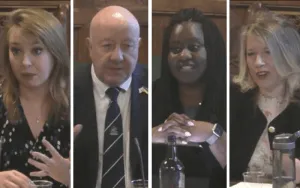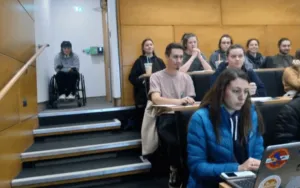Some of the main political parties fighting the general election have still not published accessible versions of their manifestos, with just a week to polling day.
The worst offender is the right-wing Reform UK, which has so far failed to provide any accessible versions of its manifesto, preventing many disabled people from viewing its policies.
But some of the other smaller parties had also failed by 10am today (Thursday) to produce manifestos in some of the formats, including large print, easy read, Braille, British Sign Language (BSL) and audio.
The Greens, despite offering several disability-friendly policies in their manifesto, have so far only produced an easy read version of their manifesto, with no Braille, BSL, audio or large print versions.
The SNP has released a large print version, and it asks visitors to its website to email for a Braille copy of the manifesto, while there is a BSL version available on its website.
It originally said on the site that audio and easy read versions were “coming soon”, but that message has now been removed.
Until this week, the Conservatives – who pledge in their manifesto that they will make Britain “the most accessible place in the world for people with disabilities to live, work and thrive” – had not published any accessible versions, but they finally added audio, BSL, large print, easy read and Braille versions on Tuesday, just nine days before the election.
Labour has produced large print, easy read, Braille, digital Braille and BSL versions of its manifesto.
It has yet to publish an audio version of its manifesto, although it has released a “synthetic audio” version, which uses artificial intelligence and is less easy to understand than a human reading the document.
The Liberal Democrats have published easy read, Braille, BSL and audio versions.
Although there is no large print manifesto, the party has released plain text and clear print versions, which allow the text size to be easily enlarged.
Plaid Cymru has published easy read, large print, audio and BSL versions of its manifesto but does not mention Braille.
Deborah King, co-founder of Disability Politics UK, said: “Disability Politics UK would like political parties to tell the truth to disabled people about what plans they have for social security, work, transport, health and social care.
“It is the responsibility of the communicator to communicate in a way that people can understand.
“Parties who fail to provide accessible Information are unlikely to get disabled people’s votes.”
She said she was pleased that some parties had made more of an effort at this election to produce accessible manifestos.
She added: “The parties underestimate the audience for accessible information.
“Disabled people want accurate information in plain language about what the various political parties are going to do if they vote for them.
“The parties could be marketing their ‘offer’ to the voting public in different ways, for example, by encouraging people to read or listen to manifestos on the way to work, to listen to the audio versions while doing housework or while running.
“I hope that members of the public will make the effort to post the various accessible versions in their own social media.”
The Electoral Commission stressed this week that accessible formats should be released at the same time as the manifesto is published.
A spokesperson for the commission said: “Political parties are responsible for the production of their own manifestos but we have recommended that, when they publish manifestos, they should make sure accessible formats are available at the same time, so that disabled people have just as much time as anyone else to understand what parties stand for.”
But she added: “We don’t have any powers to investigate or take action around how parties publish their manifestos.”
Disability News Service approached Reform, the SNP, the Green Party and Plaid Cymru, but none of them had commented on their accessible manifestos by 11am today.
Picture: (From left to right) Party leaders John Swinney (SNP), Nigel Farage (Reform) and Adrian Ramsay (co-leader of the Greens)
A note from the editor:
Please consider making a voluntary financial contribution to support the work of DNS and allow it to continue producing independent, carefully-researched news stories that focus on the lives and rights of disabled people and their user-led organisations.
Please do not contribute if you cannot afford to do so, and please note that DNS is not a charity. It is run and owned by disabled journalist John Pring and has been from its launch in April 2009.
Thank you for anything you can do to support the work of DNS…

 Disabled peers speak of ‘daily fight’ against access barriers in House of Lords
Disabled peers speak of ‘daily fight’ against access barriers in House of Lords Lords is ‘aeons ahead’ of Commons on access, disabled MP tells colleagues
Lords is ‘aeons ahead’ of Commons on access, disabled MP tells colleagues Impact of loneliness on young disabled people is ‘wide-reaching’, new research finds
Impact of loneliness on young disabled people is ‘wide-reaching’, new research finds